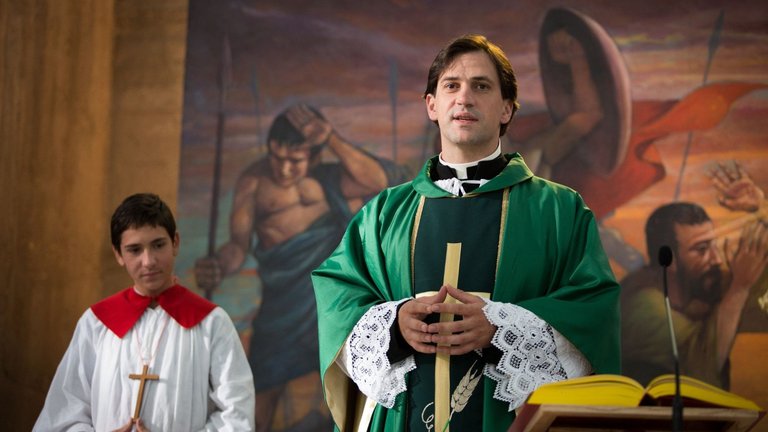Retro Film Review: Agape (2017)

There are countries where the Catholic Church has huge influence on almost every aspect of life, there are countries where that influence is really huge, and then there is Croatia. In the 1990s, this was reflected in Antonia Bird’s Priest being strangely absent from Croatian cinemas, video stores or television. Times are, however, changing, although it has less to do with Croatia itself and more to do with global trends, namely the years of widely reported sex abuse scandals that Hollywood couldn’t afford to ignore any more, paving the way for other cinema industries to follow its example. Croatian filmmakers began to deal with the issue, with the 2013 dark comedy The Priest’s Children using it as part of its subplot. Four years later, sex abuse in the Catholic Church is the main subject of Agape, a drama directed by Branko Schmidt.
The protagonist of the film, played by Goran Bogdan, is Miran, a priest who runs a parish in an impoverished blue-collar neighbourhood of Zagreb. From the outside, he appears to be a good priest and a good man; he takes a genuine interest in the well-being of his parishioners, teaches catechism in the local high school with a great deal of understanding for his teenage pupils and tries his best to take care of the boys from the local orphanage. He also appears “hip” by spending his free time working out in the gym, riding a motorbike and playing video games, the latter often in the company of orphanage boys he regularly invites to his house. Among them is young Goran (played by Denis Murić) who appears to be very fond of Miran. Everything changes with the arrival of Gabrijel (played by Pavle Čemerikić), a physically attractive boy who brings more than palpable attention from the priest, but fails to respond in kind. Jealousy, alcohol abuse, homophobia and conformism produce a turn of events that would shatter Miran’s life.
In the 1990s, Branko Schmidt, due to his conformist “patriotic” films, was perceived as a filmmaker typical of everything wrong with Croatian cinema. With Agape, he continues his transformation into one of the best and most interesting Croatian filmmakers, a process that started with the 2009 Metastases and continued with the 2012 Vegetarian Cannibal. Just like in those two films, written by novelist Ivo Balenović, he gives an uncompromisingly bleak portrayal of Croatian society’s dark underbelly and does so with great skill. The script, which apparently took some time to be finished, is relatively simple and this reflects in the short running time of 77 minutes. Everything in the film looks natural, even the acting – one of the blackest spots of Croatian cinema – is good. Goran Bogdan, known to the international audience for appearing in one season of Fargo, plays his role very well. He is helped by young colleagues from Serbia – Čemerikić (with whom he appeared in The Last Panthers miniseries) and Murić. Another interesting casting choice is for the role of Miran’s wealthy and bigoted parishioner who complains about his daughter dating a dark-skinned Muslim; he is played by Bosnian Muslim actor Emir Hadžihafizbegović.
Schmidt’s direction in this film is simple, but subtle. Although it deals with sex abuse, there isn’t any explicit sexual content in the film. Agape very slowly but convincingly builds the case that the priest has some disturbing urges towards the boys in his care, but leaves much of the interpretation of his actions and motives to the audience. Violence is, on the other hand, quite graphic (and it caused certain controversy by being used in the pre-release marketing). Schmidt puts authentic Zagreb locations to good use, and that even includes somewhat “artsy” scene at the railway junction where two characters symbolically part ways. There are some interesting details that point to Schmidt’s sources of inspiration – the most obvious is Gabrijel looking like Tadzio in Visconti’s Death in Venice. Schmidt’s film also doesn’t shy away from putting Church sex abuse into the broader context of Croatian social pathology, which includes scenes that portray rampant and sometimes violent bigotry (more explicit among younger than older generations of Croatians) and widespread corruption, which includes Church officials involved in shady real estate deals and more than willing to deal with sex abuse allegations by burying them under the carpet. Some of the elements in the film, however, don’t work; the subplot dealing with Miran’s long-suffering older sister (played by Darija Lorenci) seems unfinished. The ending of Agape is open and it would look natural, but is a few minutes overlong. Despite these minor flaws, Agape deserves praise, not only for the authors’ bravery in dealing with a difficult and unpleasant subject, but also because it dealt with it with great skill.
RATING: 8/10 (+++)
(Note: The text in the original version was posted here.)
Blog in Croatian https://draxblog.com
Blog in English https://draxreview.wordpress.com/
InLeo blog https://inleo.io/@drax.leo
LeoDex: https://leodex.io/?ref=drax
Hiveonboard: https://hiveonboard.com?ref=drax
InLeo: https://inleo.io/signup?referral=drax.leo
Rising Star game: https://www.risingstargame.com?referrer=drax
1Inch: https://1inch.exchange/#/r/0x83823d8CCB74F828148258BB4457642124b1328e
BTC donations: 1EWxiMiP6iiG9rger3NuUSd6HByaxQWafG
ETH donations: 0xB305F144323b99e6f8b1d66f5D7DE78B498C32A7
BCH donations: qpvxw0jax79lhmvlgcldkzpqanf03r9cjv8y6gtmk9